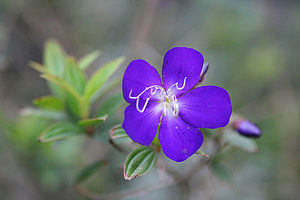Melastoma polyanthum
| Melastoma polyanthum | |
|---|---|
 |
|
| Scientific classification | |
| Kingdom: | Plantae |
| (unranked): | Angiosperms |
| (unranked): | Eudicots |
| (unranked): | Rosids |
| Order: | Myrtales |
| Family: | Melastomataceae |
| Genus: | Melastoma |
| Species: | M. polyanthum |
| Binomial name | |
|
Melastoma polyanthum Blume 1831 |
|
| Synonyms | |
|
|
Melastoma polyanthum is a species of shrubs, of the plant family Melastomataceae. It widely distributed across Southeast Asia through to Australia, where it occurs mainly near the coasts of the north and east of the country. Common names include Lasiandra, Blue Tongue,Straits Rhododendron and Chinese Wild Peony. Its fruits are edible though staining the mouth black, and the leaves and sap are used in herbal medicine.
M. polyanthum is a shrub, to 2.5 metres. The leaves are opposite, elliptical, coarsely hairy, with three longitudinal veins. The 8 mm petiole is also hairy. The bark is gray and scaly. The flowers are purple, to 8 cm, with yellow stamens. There are 5 petals.
M. polyanthum is found in Southeast Asia including VietnamBorneo, Papua New Guinea, New Hebrides, and Australia.
The plant is used to make grass jelly (cincau perdu) in Indonesia. The fruits ripen to dark gray, and contain an edible purple pulp around the seeds. It stains the mouth black (hence the name of the genus).
Sap or an extract from the leaves is used as a herbal medicine against a number of conditions including diarrhoea, burns, ulcers, wounds, piles and thrush in Indonesia and the Solomon Islands.
...
Wikipedia
